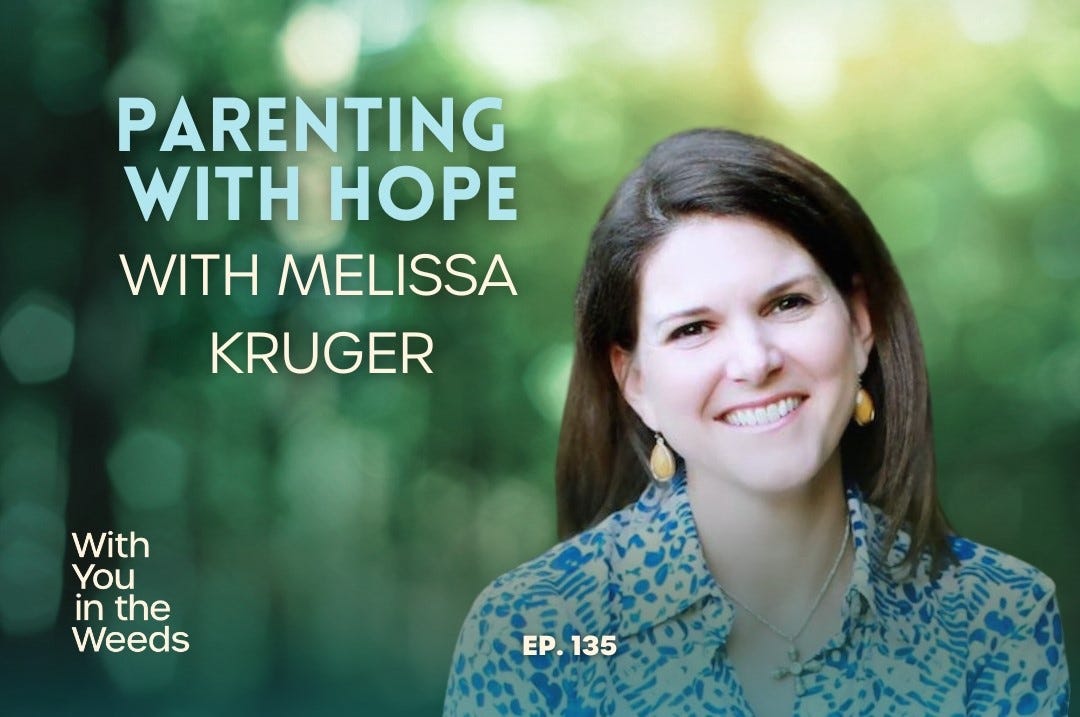Parenting With Hope with Melissa Kruger
Live wisely and engage gracefully
Are you bogged down by the day-to-day struggles of parenting? Do you question if anything is getting through to your kids? Do you feel powerless to impact your child’s spiritual growth?
Parenting teens can feel like navigating a storm—chaotic, unpredictable, and uncertain. How do you guide them toward faith and wisdom in a world pulling them in every direction?
In this last episode of our series, Parenting in the Weeds, Austin interviews Melissa Kruger, author of Parenting with Hope: Raising Teens for Christ in a Secular Age. Melissa, a seasoned parent and former high school math teacher, shares insights from her journey, blending biblical wisdom with practical strategies for shepherding teens through this turbulent season of parenting.
Listen in as Austin talks with Melissa about:
The power of asking questions over dictating answers
The effectiveness of an invitational approach to studying the Bible with your teen
The wisdom of avoiding a fear-based controlling approach to parenting
The ultimate place to find hope when you’re feeling discouraged
While this episode focuses on parenting teens, you’ll hear timeless principles that you can use with children of any age - and be reminded that your hope rests not in perfect parenting or your child’s behavior, but in Jesus, who never fails.
Highlights of Austin’s Conversation with Melissa
We are so excited to have Melissa Kruger on our podcast today. She is Vice President of Discipleship Programming at The Gospel Coalition and author of several books, including Parenting with Hope, which is intended for parents of teens but is also valuable for teachers, coaches, and anyone working with adolescents.
Melissa lives in Charlotte, North Carolina with her husband, who is the president of Reformed Theological Seminary and a New Testament scholar. They have three children (ages 24, 21, and 18), the oldest is married, with the youngest still at home but preparing for college.
Melissa’s Story of Parenting with Hope
I began my career as a high school math teacher at age 22, teaching 17- and 18-year-olds—just a few years younger than I was. I learned valuable classroom management skills, especially the importance of appearing confident and in control. I also learned about the importance of understanding different personalities—insights that later shaped my parenting approach.
The idea for a book on parenting teens had been marinating in my mind for years, influenced by my experiences as both a teacher and a parent. I noticed that educational techniques used in the classroom could be helpful in parenting.
My book blends biblical wisdom with developmental psychology, aiming to help parents understand their teens with both compassion and structure. I hope to encourage parents to be sympathetic without excusing sin, just as they are when raising toddlers, by understanding the unique milestones of adolescence.
I hope to encourage parents to be sympathetic without excusing sin, just as they are when raising toddlers, by understanding the unique milestones of adolescence.
This book isn't five easy steps to get your teen sorted over the weekend. This book is an encouragement to parents for how they need to walk through this season of life, not just manage their teen's behavior. Often, we see these teen years as being just about our kids, and we buckle up because it's going to be crazy.
But I began to realize that my children’s teen years are a season where God is working on me as an individual. How do I respond to someone who's slamming a door and throwing a book bag and in a really bad mood? That's God's classroom for me today. Am I going to respond like a teenager? Because we tend to go toward that kind of reaction. So I like to think of the book being for the parent of a teenager, not a book about teens.
Godly Habits for Parents of Teens
The earlier that you can begin a daily habit of reading the Bible with your children, the better. If you feel like you've waited too long and now your children are too old to begin, I encourage you to start with a conversation.
Many times, parents feel ashamed that they didn't start reading the Bible to their kids when they were younger, and so now they've got a plan and they're going to force the plan on the teen and the teens feel like their parent is angry with them.
There’s always parent guilt – Were the meals I made healthy enough? Did we go apple picking every fall? Did I decorate enough for the holidays? – those are some silly things that weigh on us. But if we feel like we missed the boat in not reading and teaching our kids the Bible, that’s a huge miss in our families. But it’s not irredeemable.
Before you teach your kids anything, you need to have genuine affection for God and his Word. When you start a conversation with your teen about it, you can apologize that you haven’t been more consistent with Bible reading. Then acknowledge that it might feel weird and awkward to start reading the Bible together now.
It’s usually shame or fear or a combination of the two that makes us force things on our kids. In Deuteronomy it doesn’t say “Have an hour-long Bible study with your family every week.” It says, “Talk about these things as you go on your way. Put them on your door frame.” Make your home a place where God's Word is talked about organically.
Three Types of Parenting
There are authoritarian parents, which are super no-nonsense with no wiggle room. There are permissive parents - no rules, anything goes. Somewhere in the middle is authoritative, where you have boundaries but also love and compassion and room for growth.
It’s important to know your own parenting style default, and also to know what you were raised in, as that’s definitely going to impact how you parent. You’re either going to be reacting to it or imitating it. Studies show that authoritative parenting (also called “parenting with love and limits”) has the best outcomes of transmission of faith from one generation to the next.
Both authoritarian and permissive parenting are driven by fear. Authoritarian parenting is driven by the fear of losing control, and permissive parenting is driven by the fear of not getting your child’s approval. When it comes to teens, you want to have close enough boundaries so that they are protected, but also wide enough boundaries that they can make their own choices.
Shepherding Teens
When your kids are teens, they’ve been in your home for many years, so they already know what you think. They don’t need you to tell them what to do. They do need you to ask questions to help them see their sinfulness when God reveals it to them. So as a parent, you’re shepherding them, not directing them.
Your teenager’s greatest problem is not their friend group, their report card, or their screen time. Their greatest problem is their battle with sin and their need for forgiveness.
Your teenager’s greatest problem is not their friend group, their report card, or their screen time. Their greatest problem is their battle with sin and their need for forgiveness.
When you ask them questions, they feel listened to, they feel like you respect what they're saying and that they’re having a conversation with you. If they find themselves at a dead end, they might actually ask your opinion. It's one thing for you to tell them your opinion, it's another for them to ask what you think.
You can readily admit to your kids that you don’t have all the answers. Navigating the teen years is really hard. ‘Why does this boy like that other girl and not me?’ It can be tempting to minimize what they’re going through. Their concerns may seem silly – but it’s not silly to them. It’s the biggest thing in their lives today. If they decide that you’re not empathetic, they will stop coming to you.
Battles & Obstacles to Godly Parenting
One of the chapters in my book is called Beware of Busyness, Sports, and Activities. Activities are good things, so we’re not fearful of them like we are of truly bad things. But Jesus was clear that following him meant understanding that anything that kept people from the kingdom was a ‘bad thing’.
As a parent, you have to monitor what your family’s schedule looks like. Your kids shouldn't bear their responsibility for deciding all the activities they should be doing. So if your schedule is overly busy, it’s time to think about doing something different as a family.
God has a plan for your child. Your job is to walk with God, pray, and obey. You do not have to micromanage your child’s life. On a horizontal level, your teen is yours. You are the parent that God has given them. But on the vertical axis, you are a steward. Your child belongs to God and he has the plan all figured out.
Sometimes we mistakenly think it’s our job to motivate our kids, especially in areas in which they show natural ability or talent. Our teens need internal motivation, not external pressure from us if they are going to succeed. Instead of asking them what they did in school that day, ask them what they learned. And remember that grades do not determine your child’s worth or identity. They’re just a snapshot of what they knew at one moment in time.
Providing Spiritual Guidance
Sometimes people ask, "Should we force our teenage kids to go to church? They don’t seem to like it very much.” I recommend starting with questions. “Why don’t you like church? Is there anything we can do to make Sundays better? Would you prefer a different service? Would you like to sit with friends?”
Just like your kid goes to math class even though they don’t like math, it’s okay to make your teen go to church with you. You can decide, “Our family goes to church.” When they’re adults, they can decide what they want to do – or not do. But that doesn’t mean it needs to be enforced harshly or punitively.
When I talk about parenting with hope, I make it clear that this is not a false or forced happiness we’re aiming for. It’s also not putting your hope in your teen’s behavior or attitude. What you’re doing is placing your hope in God who can work through hard things. You can be hopeful because you’re serving a God who is always at work and shows grace when we fail.
Prayer for Parents
Father, we thank you for your Word. We thank you that your Word guides us when we feel lost as parents. Thank you that we can be parents of teens. We know our teens are facing so many cultural pressures. We pray that they would turn to you and find abundant life in Christ alone. Help us to be good examples to our teens. Give grace to us and to our children. Thank you for saying that you give wisdom generously without finding fault. We pray for that wisdom and guidance. In Jesus’ name, Amen.
We are so grateful that Melissa took the time to be with us on WYITW and share the message of parenting with hope. Check out the resources linked to below and be sure to share this episode with someone who is in the midst of parenting teens.
Recommended Resources:
Parenting with Hope: Raising Teens for Christ in a Secular Age by Melissa Kruger
Melissa Kruger - Books and resources
Melissa’s Blog at The Gospel Coalition





